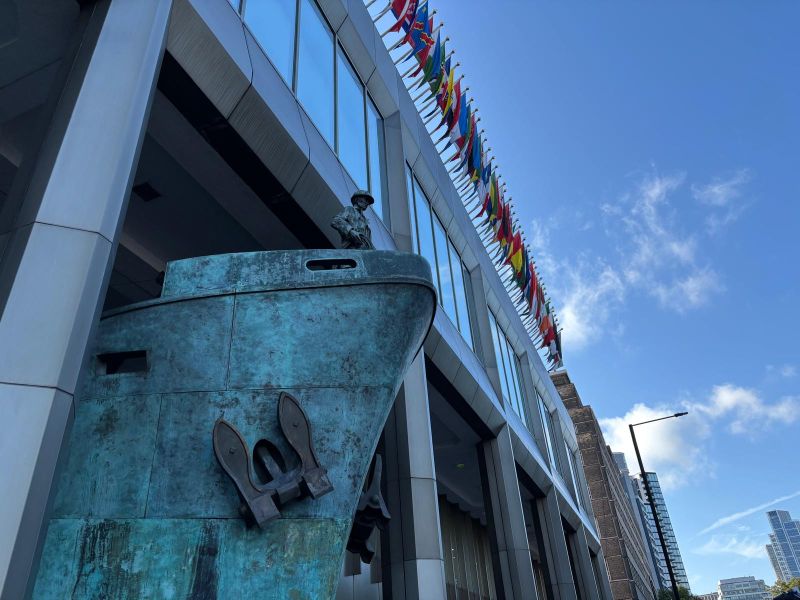World Maritime Day 2025 highlights ocean’s role in economy and climate
The Secretary-General of the International Maritime Organisation (IMO), Arsenio Dominguez, warned that the ocean is under threat, stressing that its decline is driven by human activities but can still be reversed.
“The ocean sustains life on Earth as we know it. It allows us to breathe and regulate our climate. The ocean brings food to our table, connects people across continents and provides global blue ways for the ships which transport 80 per cent of world trade,” he said in a message.
“But our ocean is under threat. Plastic pollution, rising temperatures, acidification, overfishing. Our oceans are struggling to keep up with human pressure,” he added.
Dominguez noted that protecting and restoring the ocean “is not just a duty. It is our opportunity to build a healthier planet, stronger economies and a safer future for generations to come.”
The World Maritime Day theme for 2025, “Our Ocean, Our Obligation, Our Opportunity,” reflects the ocean’s vital role in the world economy, with more than 80 per cent of global trade transported by sea.
In addition, the ocean is a source of jobs and food for millions of people, a home for countless marine species, and a regulator of the planet’s climate, mitigating the impacts of climate change.
As the largest sector operating in the ocean space, shipping therefore has a central role to play in the protection of the marine environment and in the management of ocean resources.
IMO’s long-standing commitment on this issue is evident in the robust global regulatory framework supporting cleaner, safer seas, together with a growing portfolio of technical assistance initiatives to support ocean protection in 176 Member States.
Over many decades, IMO has developed and adopted mandatory rules, recommendations and guidelines to protect the marine environment from any potential negative impact of shipping. These include binding treaties applied on ships globally.
The International Convention for the Prevention of Pollution from Ships (MARPOL), first adopted in 1973, covers pollution from oil, dangerous chemicals, packaged goods, sewage and garbage, as well as harmful emissions from ships.
Other marine environment-related treaties address the dumping of wastes at sea (London Convention and Protocol), the management of ships’ ballast water to prevent the spread of invasive aquatic species (Ballast Water Management Convention), the control of anti-fouling systems, and preparedness and response measures for spills of oil or chemicals.
These international regulations are further supported by technical assistance programmes and projects that help Member States tackle specific challenges such as marine plastic litter, greenhouse gas emissions from ships, and the spread of invasive aquatic species through ballast water and biofouling.
IMO’s work in these areas directly supports the UN 2030 Agenda for Sustainable Development and the Sustainable Development Goals (SDGs), particularly SDG 14 on life below water, SDG 13 on climate action, SDG 9 on industry, innovation and infrastructure, and SDG 17 on partnerships.
In parallel, the International Chamber of Shipping (ICS) said that this year’s theme resonates more strongly than ever. “As guardians of the blue economy, the shipping industry has both a responsibility and a unique opportunity to safeguard our oceans while delivering sustainable global trade,” it noted.
ICS pointed to the upcoming Extraordinary MEPC session, where Member States will decide on the adoption of the IMO Net-Zero Framework (NZF). “ICS is confident that with strong collaboration, Member States and industry can overcome operational challenges and take decisive steps toward true and sustainable decarbonisation of shipping,” it said.
“At ICS, we reaffirm our support for the adoption and implementation of the IMO Net-Zero Framework and the IMO as the global regulator for shipping. Together, we can ensure our oceans remain a shared source of prosperity and resilience for generations to come,” the statement added.
As also mentioned by the Shipping Deputy Ministry of Cyprus, with this year’s World Maritime Day message from the IMO, “we remember that the ocean is a source of life, jobs and food for millions of people. Cyprus, a pioneer in shipping, takes on this responsibility with determination, protecting the marine environment, investing in innovation and seizing every opportunity for sustainable development.”
In her previous speech, Deputy Minister of Shipping Marina Hadjimanolis added that “As fellow travellers in this direction, we are marching with the goal that the new generations, all of them and those who will follow, will love the sea and shipping, providing a well-educated and highly educated workforce in order to strengthen the global shipping industry to the maximum.”
The ministry concluded by wishing “Happy birthday to our shipping industry and to all those who, with dedication and courage, keep the power of the sea alive.”
The 2025 theme also emphasises the link to wider global efforts to protect the ocean, including the conclusion of the UN Agreement on the Conservation and Sustainable Use of Marine Biological Diversity of Areas beyond National Jurisdiction (BBNJ Agreement), the negotiation of a new instrument to address plastic pollution, and the third UN Ocean Conference in June 2025.
In this context, the theme will allow all stakeholders to showcase the deep interconnection of shipping and IMO in the ocean space, highlighting the importance of collaboration and coordination to ensure the sustainable and safe use of ocean resources.
Looking ahead, the World Maritime Day Parallel Event will be celebrated in the United Arab Emirates from 29 September to 1 October 2025. The celebration of the IMO World Maritime Day Parallel Event in the UAE was confirmed after the government’s offer to host it was accepted at the 122nd session of the IMO Council, held in July 2019.
Furthermore, a joint letter of invitation signed by the Secretary-General and the UAE’s Minister of Energy and Infrastructure has been issued.
The event will consist of a number of high-level panel discussions focused on IMO’s 2025 theme, “Our Ocean – Our Obligation – Our Opportunity,” featuring prominent international speakers who will offer insight into several relevant subjects.






Click here to change your cookie preferences